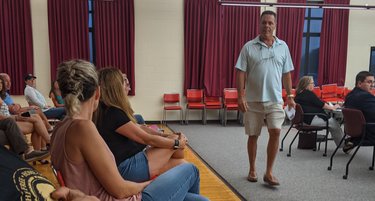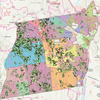Judge denies temporary restraining order in school mask-mandate lawsuit
ALBANY — Masks will continue to be worn in schools across the state while a case brought by Jeff Thomas of Knox and other local parents is being heard.
A federal judge has denied the plaintiffs’ request for a temporary restraining order from the state regulation requiring all students, faculty, and staff of all public and private schools in New York State to wear masks inside school buildings.
The request was made as part of a lawsuit filed against former state health Commissioner Howard Zucker over the mandate. The lawsuit, filed on Sept. 20, was brought on behalf of five parents whose nine children had all allegedly suffered because of the state’s mask mandate.
Judge Lawrence Kahn did allow for a faster discovery process on the plaintiffs’ request for preliminary injunction, which is to be held at a later date.
A temporary restraining order issued by a federal judge can stay in place for only 14 days, and can be extended once. A preliminary injunction is a temporary restraining order that stays in effect for the duration of the case, unless the court decides otherwise.
Kahn said the mask mandate did not impose on the students’ First Amendment rights
The First Amendment “not only guarantees the right to speak,” the plaintiffs argued, “it also guarantees the right to listen and receive information.”
The plaintiffs argued that First Amendment protections extend beyond actual speech and include what’s known as “expressive conduct,” like a facial expression. The protections apply, the plaintiffs say, “as long as the conduct is sufficiently imbued with elements of communication.”
A student’s right to listen and receive information is hindered by mask-wearing because “facial expressions made while speaking are inexorably linked to the content and meaning of speech and its message,” the plaintiffs claimed. If a teacher is wearing a mask, it will “interfere with, inhibit, alter, and distort” his or her ability “to properly communicate their message,” the plaintiffs argued, which in turn affects a student’s ability to “properly perceive the message of the speaker.”
Kahn shot down this argument.
“To begin, the Court is skeptical that the mandate in fact forces Plaintiffs to conceal their facial expressions,” the judge wrote. “The CDC and FDA have approved face masks that are clear and allow facial expressions to be seen,” he wrote of the Centers for Disease Control and Prevention and the Food and Drug Administration.
Kahn also said the plaintiffs had not shown “they are likely to establish that the mask mandate is unconstitutional,” nor had they shown they would likely be successful in proving the mask mandate does not further an important governmental interest.
Khan appeared to agree with the state’s argument, which said in part that Zucker had an interest in “limiting the spread of COVID,” while leaving “ample methods of communication available” because the mandate applies to someone only when he or she is in a school.



